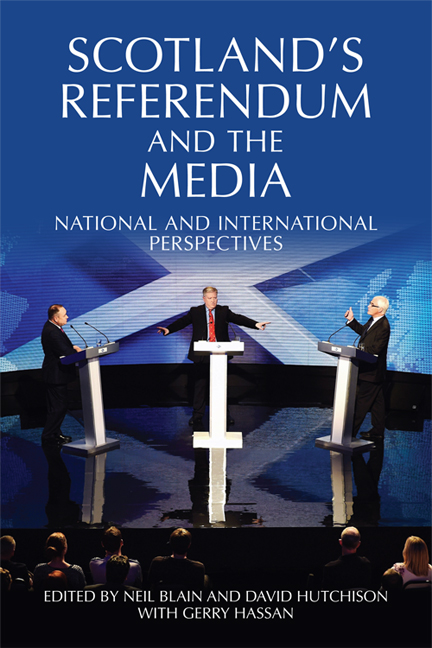Book contents
- Frontmatter
- Contents
- Preface
- Part One The Referendum in Scotland
- 1 The Unexpected Campaign
- 2 The Media Landscape in Scotland
- 3 Broadcasting and the Press: Some Key Moments
- 4 Scotland's Changing ‘Community of the Communicators’: The Political Commentariat and the Independence Referendum
- 5 The Scottish Press Account: Narratives of the Independence Referendum and its Aftermath
- 6 Scottish TV Coverage of the Referendum Campaign from September 2012 to September 2014
- 7 ‘Liked’, ‘Shared’, Re-tweeted: The Referendum Campaign on Social Media
- 8 Sport, Gender and National Identities
- Part Two Views from the UK
- Part Three International Perspectives
- Notes on the Contributors
- Index
1 - The Unexpected Campaign
from Part One - The Referendum in Scotland
Published online by Cambridge University Press: 05 August 2016
- Frontmatter
- Contents
- Preface
- Part One The Referendum in Scotland
- 1 The Unexpected Campaign
- 2 The Media Landscape in Scotland
- 3 Broadcasting and the Press: Some Key Moments
- 4 Scotland's Changing ‘Community of the Communicators’: The Political Commentariat and the Independence Referendum
- 5 The Scottish Press Account: Narratives of the Independence Referendum and its Aftermath
- 6 Scottish TV Coverage of the Referendum Campaign from September 2012 to September 2014
- 7 ‘Liked’, ‘Shared’, Re-tweeted: The Referendum Campaign on Social Media
- 8 Sport, Gender and National Identities
- Part Two Views from the UK
- Part Three International Perspectives
- Notes on the Contributors
- Index
Summary
Introduction: Campaigning and Governing in Difficult Times
The election of the Scottish National Party (SNP) majority government in May 2011 meant that a referendum was near certain, though there were some objections to holding a referendum on a retained matter. The British constitution remains a political constitution in the sense intended by Griffith, despite trends towards a constitution founded on law especially when it comes to such contested matters as Scotland's status in the union. In the event, the issue soon became less about whether there would be a referendum than about how it would be conducted.
The Scottish referendum campaign was long and intense. It was set against a difficult economic and fiscal backdrop that meant governing would be challenging enough without what some saw as the distraction of a referendum. In 2011, it was widely anticipated that the heat of the referendum would spill over into everyday Scotland and UK business, making government even more difficult. A number of commentators and opponents of the referendum warned that it would be divisive and vicious. What ensued was unexpected.
Asymmetrical Campaigns
Elections and referendums in the UK are now normally conducted under the terms of the Political Parties, Elections and Referendums Act 2000 (c. 41) (PPERA) passed by Parliament at Westminster. However, the Scottish independence referendum was conducted under ad hoc arrangements agreed between the UK and Scottish governments, since the Scottish Parliament has no equivalent legislation for the regulation of referendums. The Edinburgh Agreement, signed by the governments of both the UK and Scotland in October 2012, removed any legal dubiety and allowed for a single-question referendum, subject to review by the Electoral Commission, to be held before the end of 2014. The electorate would include all those eligible to vote in Scottish parliamentary and local government elections, with the prospect of also allowing sixteen-and sevcenteen-year-olds to participate, and with the Electoral Commission having responsibility for the referendum's conduct, including campaign regulation. It was also agreed that there would be a twenty-eight-day period during which government ministers would refrain from using their offices to campaign. A unique feature of this referendum was that two governments would be ranged against each other, one on either side of the debate.
- Type
- Chapter
- Information
- Scotland's Referendum and the MediaNational and International Perspectives, pp. 3 - 15Publisher: Edinburgh University PressPrint publication year: 2016



